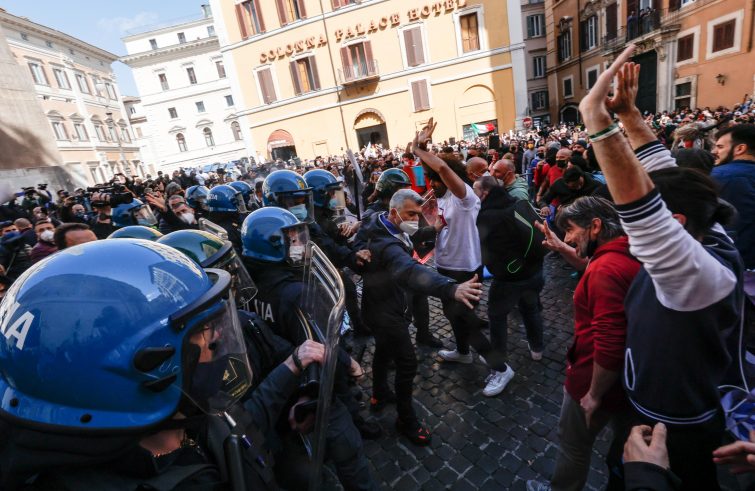
Riots broke out at Piazza Montecitorio, seat of the Italian parliament, during a demonstration organised by shopkeepers and restaurateurs calling for the reopening of businesses, but protesters flooded Italian squares from North to South. Sociologist Maurizio Fiasco reflects on the country’s current situation after a year of “forced cohabitation” with COVID-19.
 Professor, what is the origin of the street protests, including acts of violence?
Professor, what is the origin of the street protests, including acts of violence?
Forty years ago I would have said: there is a political, social and unionized segment of the country that opposes another segment, it comprises organized movements that stage street protests. Nowadays, in spite of moving from a marked divide between the majority and the opposition to the involvement of a large part of the political spectrum in shouldering the responsibility for the epidemic crisis, the top-down message is somewhat mixed. This creates more room for manipulation, for market operations on what is undoubtedly a fact, but which is subject to these distortions. In other words, the market of emotions, the market of anger, the market of resentment have become the object of pervasive manipulation. By contrast, when talking to shopkeepers, shop assistants, workers, housewives, young people, they will voice great distress but not irrational anger.
Italians are clear about the hierarchy of issues: life and health come first,
although dramatic questions linger on: ‘What will happen? How will I manage afterwards?’ These questions are not motivated by anger or irrationality. The violence that we saw in the streets and on television and the general moral sentiment, which is certainly filled with suffering and disorientation, are miles apart.
Those people taking to the streets don’t represent the real country, and yet there is a widespread feeling of distress in the country that is not properly understood by those with political and governmental responsibilities.
The Italian people share the same common sentiment, a shared feeling of suffering and widespread sobriety, which should not be interpreted as passivity.
Public displays of violence exert further violence on the people who are suffering.
Is there a way to counter such violence?
An effective way to stop the violence is to address the question: How is the daily life of millions of families being perceived? How is it being dealt with by those in positions of authority in the public sphere, in the media, in social institutions?
It is necessary that those who properly fulfil their duty and role broaden their understanding and responsibility. By broadening understanding and responsibility there is less room for instrumental use of violence,
which will never see the unemployed, the desperate shopkeeper, the housekeeper, the nurse, the carer, the undeclared construction worker, the street vendor, take to the streets. These people would have taken to the streets forty years ago in response to a national call for legitimate – and hence non-violent -political opposition.
There are those who are experiencing greater suffering from the pandemic…
Indeed, not everyone in the country has borne and is bearing the brunt of the emergency in the same way. 62% of Italians did not incur any loss of income, and 2.5% even reported an increase in their income in 2020, while 35% of Italians saw a drop in income, with one in eight reporting a decline from 25% to over 50%. If addressed responsibly, this contrast indicates the right course of action. Instead,
repercussions of the pandemic tragedy affecting a large part of the population have been overlooked by those with responsibilities in political institutions, administrations, social agencies and the media.
Within this scenario there are elements of extreme irresponsibility on the part of those who, instead of contributing to sending a unified message to the country, are trying to fan the flames of discontent. There is too much room for those who fan the flames, in Italy as well as in other countries. This is due to the fact that the overall message that is being conveyed is frequently mixed, with overtones of “pedagogical illiteracy.”
In fact, an honest and straightforward statement would be: ‘We don’t know when the pandemic will end, so we don’t know when the restrictive measures will be lifted. Until then we are all in the trenches, deliberately accepting a disciplinary approach’.
Instead, we are making the same mistake of the father who promises his child that he will be given a sweet to persuade him to take his cough syrup. Italians are treated like children who need to be encouraged with promises that are ultimately unrealistic. And when a long-term sacrifice is foreseen, it becomes a blow to public sentiment.
Who is taking advantage of this situation?
The entrepreneurs of the market of fear, the market of violence, the market of political exploitation. In sociology we have the figure of the moral entrepreneur: when faced with a surge of moral panic, i.e. a deep, widespread and pressing concern among the population at large, there are those who seize the opportunity just as an entrepreneur seizes a market opportunity. What is the environment of moral entrepreneurs? It includes individuals seeking to be in the limelight, media outlets competing for ratings, and politicians who choose the path of unfair competition. Then there is a shady milieu of speculators who have everything to gain from financial manipulation and speculation in times of economic turmoil.
Preventing this requires a responsible and rational conduct on the part of political, administrative, social and media institutions, but it also presupposes a connection with that part of society that is experiencing hardship and is eager to be represented and understood.
What do you think will happen?
A rationality agenda is emerging in the political arena. And this rationality bloc can count on the Church’s guardianship of reason, which has never been absent throughout these years and during the tragedy of the pandemic.
While the Church is a major spiritual institution, she has acted as the guardian of common sense and reason and continues to do so.
Looking back at all the Pope’s stances, they display a consistency that is astonishing in their clarity and in their epistemology of truth. The Church has been the guardian of reason and rationality in our country, often in solitude. The Church has set in motion the pedagogy that is still lacking or undefined at public decision-making levels.











